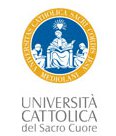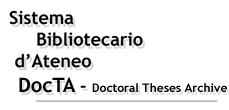|
|
DocTA - Doctoral Theses Archive >
Tesi di dottorato >
CORSO DI DOTTORATO IN STUDI UMANISTICI. TRADIZIONE E CONTEMPORANEITA' >
Citazione:
Utilizza queste indicazioni per citare o creare un link a questo documento.
|
Cabra, Giulia. "INTERSOGGETTIVITA', AMORE ED ETICA IN E. HUSSERL. DALLA PORTATA ETICA DELL'ESPERIENZA INTERSOGGETTIVA ALLA RILEVANZA INTERSOGGETTIVA DELL'AMORE", Università Cattolica del Sacro Cuore, XXXII ciclo, a.a. 2018/19, Milano, [http://hdl.handle.net/10280/84468].
|
| Titolo: | INTERSOGGETTIVITA', AMORE ED ETICA IN E. HUSSERL. DALLA PORTATA ETICA DELL'ESPERIENZA INTERSOGGETTIVA ALLA RILEVANZA INTERSOGGETTIVA DELL'AMORE |
| Autore/i: | CABRA, GIULIA |
| Tutor: | MARASSI, MASSIMO
MERTENS, KARL
BOTTURI, FRANCESCO |
| Coordinatore: | BEARZOT, CINZIA SUSANNA |
| Lingua: | ITA |
| Abstract in italiano della tesi: | Edmund Husserl tratta l’etica e l’intersoggettività separatamente e con scopi diversi. Allo stesso tempo, nei suoi testi sono presenti indizi di una mutua connessione tra tali ambiti. Nel mio lavoro intendo chiarire come sia interpretabile tale connessione. In particolare, considero che l’affermazione husserliana del valore della relazione e del dovere di promuoverla indica che il soggetto può realizzare attivamente la dimensione intersoggettiva in cui si trova solo attraverso una scelta a favore della relazione. Tale scelta presuppone l’esperienza del valore altrui. Mi chiedo quindi quali siano le condizioni dell’esperienza della rilevanza assiologica ed etica dell’altro e della relazione con lui. Per rispondere a questa domanda, mi rivolgo a due ambiti della fenomenologia trascendentale di Husserl: la teoria dell’intersoggettività e le analisi etiche. Attraverso la prima, valuto se gli strati costitutivi dell’esperienza intersoggettiva abbiano una rilevanza assiologica. Tuttavia, dati i limiti di una considerazione etica della teoria dell’intersoggettività, mi rivolgo alle analisi etiche per ulteriori approfondimenti. Esse mostrano che il valore dell’altro e il dovere nei suoi confronti sono colti dall’atto emotivo dell’amore e che l’amore a sua volta è fondato nel coglimento dell’altro come soggetto trascendentale. Così facendo chiarifico la mutua connessione tra etica e teoria dell’intersoggettività in Husserl. |
| Abstract in inglese: | Edmund Husserl treats ethics and intersubjectivity separately and with different purposes. At the same time, he disseminates clues of their interconnectedness throughout his works. In my dissertation, I aim to elucidate how to interpret their connection. In particular, I argue that Husserl’s insistence on the value of relationship and on the duty to promote it indicates that the subject can actively realize the intersubjective dimension in which it is situated only through a choice in favour of the relationship. This choice presupposes the experience of the value of the other. I thus ask which are the conditions of the experience of the axiological and ethical relevance of the other and of the relationship with it. To answer this question, I turn to two areas of Husserl’s transcendental phenomenology: his theory of intersubjectivity and his ethical analyses. Through the first, I assess whether the constitutive levels of intersubjective experience have axiological relevance. However, given the limits pertaining to an ethical consideration of his theory of intersubjectivity, I move to Husserl’s ethical analyses for further insights. These analyses show that the value of the other and the duty towards it are captured by the emotional act of love, and that love is in turn grounded on grasping the other as a transcendental subject. I thereby shed light on the interconnectedness of Husserl’s ethics and theory of intersubjectivity. |
| Data di discussione: | 23-ott-2020 |
| URI: | http://hdl.handle.net/10280/84468 |
| È visualizzato nelle collezioni: | CORSO DI DOTTORATO IN STUDI UMANISTICI. TRADIZIONE E CONTEMPORANEITA'
FACOLTA' DI LETTERE E FILOSOFIA
|
File in questo documento:
| File |
Descrizione |
Dimensioni | Formato | Accessibilità |
|---|
| tesiphd_completa_Cabra.pdf | Tesi completa | 3,61 MB | Adobe PDF | non consultabile
|
| 01_frontespizio_tesiphd_Cabra.pdf | Frontespizio, indice, introduzione | 1,22 MB | Adobe PDF | Visualizza/apri
|
| 02_riassunti_tesiphd_Cabra.pdf | Riassunto italiano e tedesco | 308,3 kB | Adobe PDF | Visualizza/apri
|
| 03_bibliografia_tesiphd_Cabra.pdf | Bibliografia | 211,63 kB | Adobe PDF | Visualizza/apri
|
|
Accesso e utilizzo dei contenuti di DocTA
|



